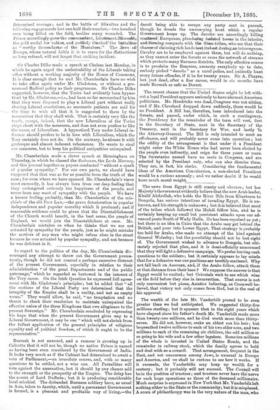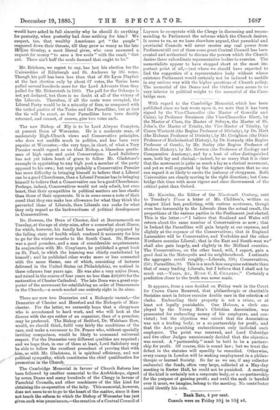The wealth of the late Mr. Vanderbilt proved to be
even greater than we had anticipated. We suggested thirty-five millions sterling; but it appears that in the eight years which have elapsed: sine* his father's death Mr. Vanderbilt made more than twenty-one millions, and he died worth more than thirty- seven. He did not, however, make an eldest son his heir ; but bequeathed twelve millions to each of-his two elder sons, and two millions to each of the remaining six children, the odd million or so going to his wife and a few other legatees. Some ten millions of the whole is invested in United States Bonds, and the remainder in railway stock, which the family agrees to hold and deal with as a council. That arrangement, frequent in the East, and not uncommon among Jews, is unusual in Europe and America, and we shall be curious to see how it works. If it succeeds, the Vanderbilts may heap up wealth for a century; bat it probably will not succeed. The Council will be in the position of trustees ; and trustees never have the nerve for such huge operations as those of the deceased millionaire. Much surprise is expressed in New York that Mr. Vanderbilt left nothing.either to the State or the community; but it is misplaced. A scorn of philanthropy was in the very nature of the man, who
would have asked in full sincerity why he should do anything for posterity, when posterity had done nothing for him P We suspect, too, that wealthy Americans get " the people " cr med down their throats, till they grow as weary as the late Greeley, a most liberal giver, who once answered a request for money " to save a few suds " with the snarl, " Get out. There ain't half the souls damned that ought to be."











































 Previous page
Previous page